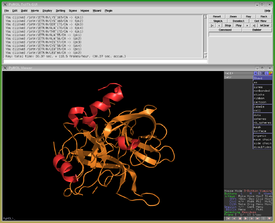- PyMOL
-
PyMOL 
A PyMOL instance, with the Viewer and GUI visible.Developer(s) Schrödinger Stable release 1.4.1 / 2 May 2011 Preview release 1.5.0 / 1 October 2011 Operating system Cross-platform Type Molecular modelling License open-source, user-sponsored Website pymol.org PyMOL is an open-source, user-sponsored, molecular visualization system created by Warren Lyford DeLano and commercialized by DeLano Scientific LLC, which is a private software company dedicated to creating useful tools that become universally accessible to scientific and educational communities. It can produce high quality 3D images of small molecules and biological macromolecules, such as proteins. According to the author, almost a quarter of all published images of 3D protein structures in the scientific literature were made[when?] using PyMOL.[citation needed]
PyMOL is one of a few open source visualization tools available for use in structural biology. The Py portion of the software's name refers to the fact that it extends, and is extensible by the Python programming language.
Contents
Non-free binaries
On 1 August 2006, DeLano Scientific adopted a controlled-access download system for pre-compiled PyMOL builds (including betas) distributed by the company. Access to these executables is now limited to paying customers but is free for students and teachers. However, the current source code continues to be available at no cost, as are older pre-compiled builds. While the build systems for other platforms are open, the win32 build system is not. Non-students and teachers can either compile an executable from the source code or pay for a subscription to the support services to obtain access to pre-compiled executables.
Pre-compiled window binaries of PyMOL is also available free from Christoph Gohlke of the Laboratory for Fluorescence Dynamics, University of California, Irvine here.
Acquisition of PyMol by Schrödinger
On 8 January 2010, Schrödinger LLC reached an agreement to acquire PyMOL. Schrödinger will take over continued development and maintenance, as well as support and sales of PyMOL, including all current subscriptions. Schrödinger LLC will also continue to actively support the open-source community of PyMOL.
Gallery
-
Example of some molecular editing features of PyMOL, dihedral bond rotation and interactive molecular relaxation with "Sculpting mode", these are useful features for preparation of input geometry for quantum chemistry software
See also
- Gabedit
- List of molecular graphics systems
- List of web resources for visualizing molecular dynamics
- Molden
- Molekel
- Molecular modelling
- Software for molecular mechanics modeling
External links
Categories:- Molecular modelling software
- Free science software
-
Wikimedia Foundation. 2010.
